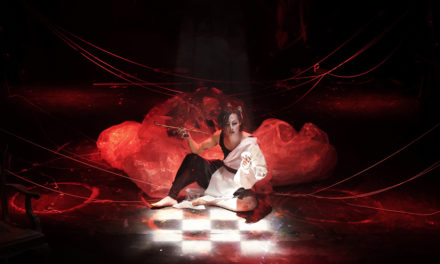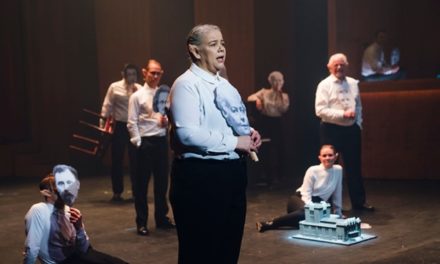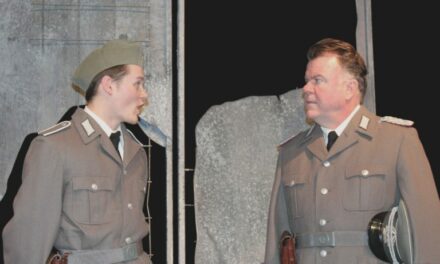In the past few months, the Korean theatre scene has been under intense public scrutiny as artists—mostly women—publicly shared their experiences of sexual harassment and assault. Adopting the #MeToo and #WithYou hashtags that motivated similar revelations in other countries, the victims called out prominent theatre artists and celebrities such as Lee Youn-taek, Oh Tae-seok, Jo Min-ki, Jo Jae-hyun, and many others. Multiple accounts of Lee’s behavior, including allegations of rape, and the normativized culture of power-based violence within his company, Yeonheedan Street Troupe, were especially earth-shattering, due to the abnormal demands forced on young female company members.
However, news coverage of the “#MeToo wave” in Korean theatre has focused largely on high-profile scandals without providing context on how they fit into a larger culture of authoritarianism and silence. Lee was arrested and faces trial after seventeen victims pressed charges against him, but activists argue that little has actually changed after the fierce media storm in February and March of 2018.
To gain a larger perspective on the power structures in South Korean society that enable these numerous and sustained instances of sexual violence within the theatre industry, I spoke with Hong Yewon, a performer and movement director who works as an organizer at Theatre Artists against Sexual Violence, one of the most active groups supporting the #MeToo Movement in Korean theatre. The interview took place on May 4, 2018, and has been edited and condensed with the interviewee’s approval.
Barriers to Speaking Out
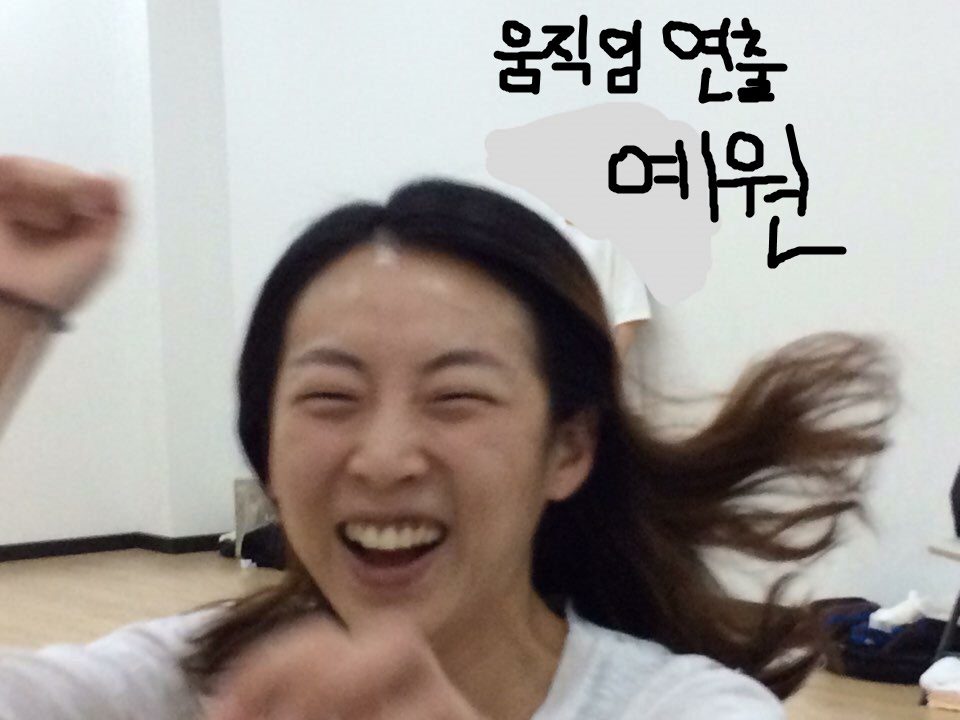
Hong Yewon, organizer at Theatre Artists against Sexual Violence. The written text in the image reads: “Movement Director Yewon.” Photo: Hong Yewon.
My hope is that this interview can provide context for readers abroad as to why the #MeToo movement surged recently in Korean theatre, and why it was difficult for victims of sexual violence to speak out in the past.
We get that question a lot. Some journalists, who don’t really understand the arts and culture sector, ask why these incidents are so widespread specifically in the theatre industry. But this isn’t a problem specific to theatre. We’re not trying to say, “It’s not just us.” It’s true that sexual violence incidents have come up frequently in the arts, especially in theatre. But I think the reporters who ask that question are assuming that theatre is somehow closed off from the rest of society. They make that assumption because Lee Youn-taek’s Yeonheedan Street Troupe, which got the most media attention, was a secluded commune that operated in a way that defies common sense.
As to why victims couldn’t speak out before, first, we have to talk about how Korean society as a whole is closed and repressive. Recently, The National Human Rights Commission and Ministry of Culture, Sports, and Tourism sent out a questionnaire about sexual abuse and violence in the arts. But there were some questions where my honest response didn’t fit into the given range of answers. For example, it felt like the questionnaire was limiting sexual violence to incidents that were serious enough to appear in the news. In other words, they were only considering big cases like Lee’s. But this can all be traced back to phallocentrism in our society, the objectification and commodification of women. Theatre reflects these oppressive social institutions. People ignore this, and believe that unthinkable violence exists only in theatre because it’s too isolated.
Going back to the question, the first reason is because society itself is repressive. Secondly, most cases are in a gray area where speaking out doesn’t always seem like the best option.
I wanted to ask about that as well. The news tends to focus on the most serious—
Most sensational.
Right, most sensational incidents. The public can easily agree that these are serious crimes. But we don’t get a sense of the full range of sexual violence.
With minor offenses, you tend to consider your relationship with the offender and the seriousness of the action—especially if they are a collaborator on a production. For example, when men comment on how women should dress, it’s hard to take them to task for their words every single time. Little things like that pile-up. When offhanded comments are tolerated, the general level of verbal abuse increases by a little. It wasn’t a problem before, so it won’t be a problem now—that kind of mentality.
It’s easier to respond to an aggressor you don’t know personally. Sexual violence experts all say this, but when someone gropes you on the subway, it’s relatively easy to say, “Stop that.” But these are your colleagues. If there is something unique about sexual violence in the theatre as opposed to other workplaces, it would be that there is a much larger power structure in place at a company. And your livelihood depends on it. Even after you’re punished for speaking out, you still have to go to work and face social ostracism. Of course, there are power structures in theatre as well. Sometimes it’s hard to bring things up to the director. But usually, you’re working with others on something.
Is it harder to speak out because theatre likes to emphasize things like collaboration and community?
Even if you’re not idealizing those things, you need chemistry with your collaborators for a project to succeed. Ultimately, we’ve been thinking about it in the wrong way. If one person has to remain silent for the benefit of an organization or a project, that’s not community. That’s group mentality. A community should give voice to all of its members. We’ve been caught up in group mentality disguised as community.
That idea of community might have made it harder for people to speak out in theatre companies led by older artists. But luckily, younger companies have moved away from that kind of hierarchy. Their members can say what they think and make demands. These younger companies don’t get a lot of public funding, so they’re free from that constraint as well—as sad as it is. But self-censorship can still exist in that environment. You could think to yourself, “Do I really have to be so abrasive to my collaborators? Is it worth letting a minor incident potentially ruin this project?”
Theatre Artists against Sexual Violence
Could you talk about how you and others founded TASV?
It was the day before the Korean New Year holiday (February 14, 2018). Kim Soo-hee, the artistic director of Theatre Company Mi-in, publicly recounted her experiences of sexual violence when she was in Lee Youn-taek’s troupe. Several of us contacted one another as soon as we saw her Facebook post. We said, “We have to meet and talk about this. We have to find a way to say out loud that we support Kim.” We met, but we couldn’t release a public statement because we weren’t an organization yet. That was on a Wednesday, and the only decision we made was to hold a forum the next Wednesday to discuss this issue. We put up an announcement to meet on an existing group’s web page, the Conference of Theatre Artists for the Elimination of Blacklisting and Establishment of Public Theatre (Blacktapa, for short.) It was a four-day holiday after that, and as you know, explosive revelations made headlines all throughout the New Year’s break. Around 130 people came to the forum the following week. There were so many people. The people there agreed on the name “Theatre Artists against Sexual Violence,” and that’s how we founded the group.
The first thing that we set was a “Victim First” policy. Also, we resolved not to stand with anyone who has committed sexual violence. After that, we discussed a wide range of issues—that we will strive to fight power-based violence and sexual violence, and that we will stand by victims all the way. We knew then that by June or July, the victims would be fighting alone. These are people who had to muster a lot of courage to speak out. We decided we won’t let that happen. The reason is simple. They are our colleagues. If something like that happened to me, I trust them not to leave me struggling by myself. I think that’s the true spirit of community in theatre, the strength to band together.
TASV took shape and responded to incidents very quickly after the first revelations came out. Were you able to predict how events would develop?
No. Actually, the press wanted responses on a much faster cycle. But because we wanted to fight against all forms of power-based violence, we couldn’t let five or six core members make all the decisions. About thirty people participated in all-night meetings on Telegram group chat. It took forever to decide anything. But the time and effort were definitely worth it. Usually, movements like this lose momentum after a few months and people start leaving. Our organization has been able to stay united because we didn’t want people to feel exhausted. If someone says, “I need to step out and work on my production,” someone else can respond, “Take the time you need.” And when I return, that person can go do their work for a while. This rotation system helps us support one another.
We were able to respond quickly to urgent matters, such as releasing public statements and responding to the press, because we’ve become seasoned activists. Many of us are used to working together in an organization because we participated in Daehangro X Forum, a group created during the blacklist scandal for people to freely discuss important issues. We knew how to seek out legal advice and form strategies—and not to trust bureaucrats. After Daehangro X Forum in late 2014, early 2015, there was the Blacktent project, the Censorship Whitepaper Committee, and Blacktapa. There was also something called the “2030 Group” where younger theatre artists—I’m in my 30s—could voice their concerns in meetings that would run for six, seven hours at a time. Basically, we had formed a lot of groups that had nothing to do with making theatre, and we built solidarity through this activism. And we knew what we wanted to do better or differently based on our previous experiences.
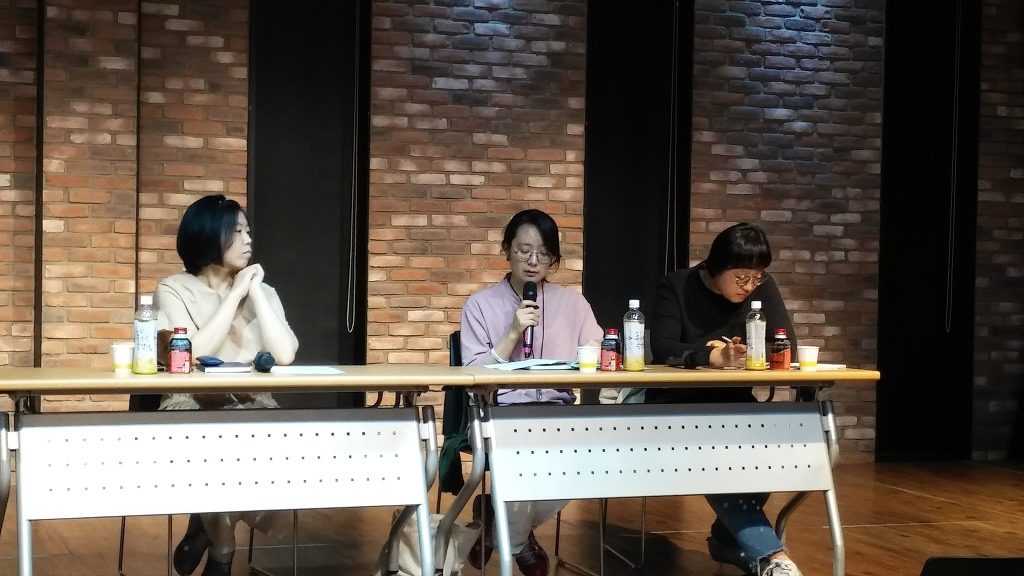
Forum held by Theatre Artists against Sexual Violence on May 13, 2018. Shown here are Lee San (mime artist, organizer at TASV), Kim Hong Mi-ri (feminist researcher and activist), and Dalgaebi (activist at Womenlink’s Sexual Violence Help Center). Photo courtesy of Theatre Artists against Sexual Violence.
#MeToo and the Blacklist
The blacklist protest and #MeToo Movement both resist forms of power-based violence. But Lee Youn-taek was also a symbolic figure during the blacklist scandal, often appearing in interviews as a representative victim of injustice. Where do you see the connections and breaks between the two movements?
It’s true that Lee was blacklisted. He has the right to protest if he was censored. But his crimes are a completely separate issue. Among the activist organizers at TASV, I’m the only one who helped run the Blacktent theatre. And I’ve struggled with self-censorship. I asked myself, “Is it okay to work at TASV when I watched Lee’s troupe perform in the Blacktent?” Speaking personally, I couldn’t say anything against Lee at the time because I didn’t know the facts. There were a lot of rumors going around, but it was unclear who the victims were and what the terms of abuse or violence were exactly. I couldn’t ask the Blacktent people to exclude someone based solely on hearsay. Another member of TASV knew one of the victims very well at the time, but that victim didn’t want to make their case public. In that situation, it’s not putting the victim first if a third party speaks out in their place.
Currently, we’re reexamining what it means to put the victims first. Is it about letting victims make decisions based on what they want? Not always. The problem there is that they end up bearing the full consequences of their decision by themselves.
TASV has held gatherings every Monday since it was founded. What do you talk about in those meetings?
Even after other people and the media moved on, we held meetings where people could just vent for a long time. Some people still had things to say. If even one person still wants to speak, we can’t declare that we’ve spoken enough and should start thinking about the next step. That’s not putting the victims first.
We played a board game that uses examples of sexual violence and ways to address them at our last meeting (April 30, 2018). The expert who ran the activity said that when people play this game during a corporate training session, it only takes an hour or two. But we could have gone on for four hours or more because we took the problems introduced by the game so seriously.
We’ve started talking about education—not foundational theories but the kind of education that we need out in the field. We’ve actually sent out lecturers to a few theatre companies. For example, we provided sexual violence prevention training for the teams participating in 1 Hyehwadong Theatre’s spring festival. We hold roundtables where participants consider various scenarios and find solutions. But we want to move beyond these scattered efforts and develop a training system. You have to take mandatory safety training to work in a government-run theatre. It might only be a formality, but people are forced to look at slides and take evaluations and earn a certificate. We need the same thing for sexual violence prevention.
We talk a lot about education in general because these rigid power structures often begin at school. Have you been to a production at a major theatre where the director or one of the cast members also teaches at a university, and a flock of students are in the audience all wearing their theatre department’s letterman jackets? And they bow to their teacher as a group after the performance? It’s really weird. Newer students have to be so deferential to their seniors, even though they are only a couple of years older. I don’t understand why theatre professors allow that. Those students will become colleagues when they go out into the field.
Words such as seonsaengnim (teacher) and seonbae (senior by entry year at an organization) are incredibly powerful in Korean society.
I actually think seonbae can be a positive term, but seniority works very strangely in Korea. It becomes a kind of absolute hierarchy. A person who recently graduated from a prestigious arts school said in one of our meetings that there were a lot of incidents at school that they now see were violence and exertions of power. They only came to that realization a few months ago and it made them feel very sad and upset. You learn these things without knowing it. I don’t know about other parts of society, but seniority relationships are very strong in theatre. If the theatre industry really is more oppressive, that’s probably the reason.
For that reason, we use elevated speech to everyone regardless of age or familiarity at TASV. [Translator’s note: The Korean language has multiple speech levels, which can instantly denote hierarchy between the two speakers.] We also never use honorifics such as seonsaengnim or seonbaenim to each other. We address people by their names, adding the suffix –ssi or –nim to be equally respectful. If you don’t want to use your name, you don’t have to.
The Need for Change
We’ve seen powerful men in theatre lose membership from associations, have past awards canceled, and get disqualified from public funding. We’ve also seen some of them face legal punishment. What do you think are the effects and limitations of watching these figures fall—the so-called “Weinstein effect?”
The limitations outweigh the positive effects. If an association revokes an aggressor’s membership, the other members probably discussed the matter and voted on it. But when it comes to denying them public funding, I’m not confident that the Ministry of Culture has established rational standards beforehand. We see a lot of frustrating cases because those standards don’t exist. For example, Arts Council Korea canceled Mokhwa Theatre Company’s The Hourglass after funding the piece’s development because their artistic director Oh Tae-seok was accused of sexual misconduct by multiple people. But Mokhwa’s Romeo & Juliet toured to a festival in Romania with funding from the Korea Arts Management Service. [Translator’s note: The same production was also scheduled for the Taiwan Traditional Theatre Festival, but was canceled after activists brought attention to the allegations against Oh.] The government people defended themselves by saying that Oh’s name was taken out of the credits, that he didn’t get a plane ticket. It’s nonsense. They’re gesturing that they want to solve these problems, but they’re actually covering them up. We need to set clear standards on what defines sexual aggression. Sometimes we see the expression “involved in sexual misconduct” in press releases, but what are the boundaries of “involvement,” and how do you hold the aggressors accountable? This isn’t a system that can be created overnight. There are a lot of entangled interests, and approaching these issues haphazardly can create innocent victims as well as aggressors who walk free. It’s just like the blacklist scandal.
Still, do you think that there is symbolic power in Lee’s arrest, or do you think it gives the false impression that these problems have all been solved?
The latter. Lee’s arrest is good news to his victims, at least. I’ve heard that they are going through a difficult time right now in court. If he wasn’t arrested, things would be much harder for them. But many other aggressors are off the hook because of this one incident.
To us, the theatre is like the water that a fish lives in. It’s the air we breathe. We have to live here. We shouldn’t rely only on police investigation and the law, which have limited boundaries, to solve these problems without trying ourselves to make the place we call home better. We need a fundamental change in the system. And for that to happen, we need to raise our understanding of sexual violence and our sensitivity for human rights and gender politics.
This post was written by the author in their personal capacity.The opinions expressed in this article are the author’s own and do not reflect the view of The Theatre Times, their staff or collaborators.
This post was written by Kee-Yoon Nahm.
The views expressed here belong to the author and do not necessarily reflect our views and opinions.


